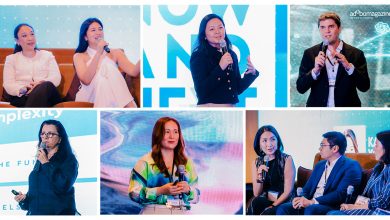MANILA, PHILIPPINES — Influencer marketing as we know it goes against our scientific understanding of human desires, said Dennis Perez, Digital Marketing, Media and Commerce Lead for Unilever Philippines. Dennis made the bold claim in “Others Say: Bringing Influencer Marketing from Renaissance to Enlightenment,” a talk delivered at DIGIMAX: IMMAP Digicon 2023, on October 19, 2023 at the Marriott Grand Ballroom, Pasay City.
Working with the Freudian concepts of Id, Ego, and Superego, Dennis explained that the current paradigm of influencer marketing interferes with the value exchange between influencer and follower. Influencers are, for instance, driven by the Id’s desire to be unique, while followers driven by the Id’s desire to belong are drawn to the communities created around influencers.
But commercialization tends to throw a wrench into that system. Much of influencer marketing today is predicated by the same metrics used for media channels: reach and engagement. Because these metrics can be achieved through optimal methods, this system tends to promote homogeneity across different influencers. In short, commercialization makes content creators sound the same – and worse, it makes them sound like any other media channel.



“That violates the currency of trust, destroying the whole balance of the influencer-follower ecosystem,” Dennis explained.
This disruption results in losses for all parties. Influencers lose their uniqueness, while followers grow distant from content creators who no longer feel authentic. The brands that invest heavily in these strategies end up spending on fast-diminishing returns.
“I believe we are in a pivotal time in marketing, where we are peaking from the enchantment of connections in digital and transitioning to understanding the science and psychology of how brands can move people through the voices of others,” Dennis said.
“We must go back to the basics and act as part-time psychologists trying to understand the motivations, desires, and aspirations of our audience.”
In their work at Unilever Beauty & Wellness, Dennis and his team have been advocates for Others Say, a philosophy that aims to borrow the voices and authority of others to deliver messages, in a way that doesn’t disrupt the natural psychological exchanges between people. In the case of influencers and their audiences, this entails shifting our mindsets away from the concepts of “influencers” and “marketing,” and towards long-term trust-building exchanges wherein brands can fit seamlessly into the existing relationships between community leaders and their followers.
To achieve this, brands need to have the following goals in mind: 1) diversification of voices; 2) de-owning of relationships; and 3) impact that matters.
Diversification of Voices
If Others Say is about borrowing others’ voices, it isn’t enough to find as many voices as possible; brands need to make sure that they are tapping the right voices, as well. Traditional influencer metrics, unfortunately, aren’t very good at identifying them.
“Engagement metrics will not separate the engagement if it’s a trending dance craze, or maybe they’re real fans, versus the real engagement associated with your brand,” Dennis explained.
Subject matter experts and relatable personalities matter just as much as traditional key opinion leaders because they bring different types of value to the audience. Having a diverse set of voices also makes campaigns feel more accessible, which in turn allows more people to derive value from the exchanges created by brand-initiated content and activities.
De-owning Relationships
“When borrowing the voices of others, a brand needs to be aware – very aware – of when to give it back,” Dennis said. Brands need to take care not to monopolize conversations, and instead uplift the diverse array of voices willing share their messages.
In a partnership with YouTube, for example, Dennis and his team saw that the lead voice in a fandom isn’t always the loudest or the one with the highest reach in social media. In the case of BTS’ fandom in the Philippines, for example, the president of the country’s largest fan group is also a lawyer who helped score the tests in the most recently concluded board exam.
“Seeing ads will not sit well, and will feel opportunistic in a fandom channel,” he explained. Instead of dictating to these voices on how to integrate your brand, Dennis suggested just asking them to be who they already are to the community.
Impact that Matters
The diversification of voices and de-owning of relationships involved in Others Say necessitates a change in how brands measure a campaign’s impact, as well.
“Because Others Say is about borrowing their [voices] authority, we also measure trust through reverse assessment,” Dennis said. “Reverse assessment is something that only people can do, not media channels.”
In Unilever’s case, this entails asking content creators to rank the brand’s brief and engagement with them in order to understand how brands can respect their freedom to create content with which they are comfortable. This level of trust between brands, voices, and the communities involved is a measure of impact that matters more than ever.
There are, however, two caveats to adopting Others Say. The first is that, because the entire philosophy is predicated on appreciating human psychology and subjectivity, it may not apply for all cases. Brands need to pick and choose which of their campaigns are best suited for an Others Say strategy.
The second caveat, according to Dennis, is that brands attempting Others Say need to be in it for the long haul. “It’s not a short term branding exercise. If we treat them [influencers] as people with voices and not channels with reach, be ready for a marathon. It takes consistency for the [audiences’] ego to accept that this is not marketing.”
“So we need to stay on and build trust,” he said.
adobo Magazine is media partner of DIGIMAX: IMMAP Digicon 2023.








